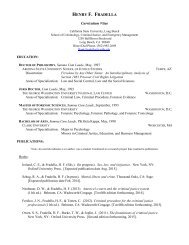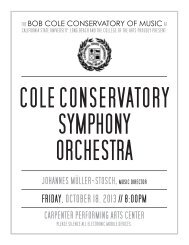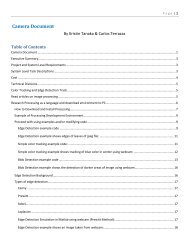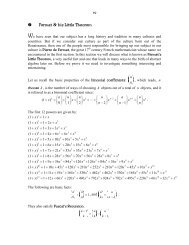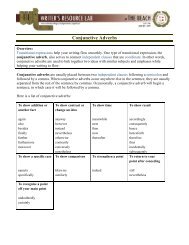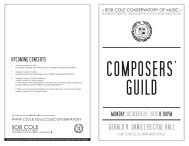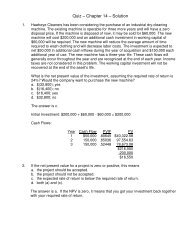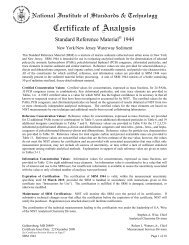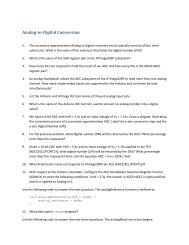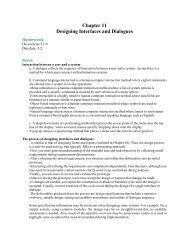Untitled - California State University, Long Beach
Untitled - California State University, Long Beach
Untitled - California State University, Long Beach
You also want an ePaper? Increase the reach of your titles
YUMPU automatically turns print PDFs into web optimized ePapers that Google loves.
as he interferes with her dream, causing confusion and further regression<br />
into a duplicitous interiority. The very fact that Eve is mediated through<br />
her innermost thoughts adds to the feeling that she is an interior being.<br />
Tellingly, Satan appeals to Eve’s desire to ascend the earthly realm and<br />
reunite with God. As a subject of both Adam and God, Eve is more<br />
inclined to long for a higher status, wherein Adam is already God-like<br />
in Eve’s eyes. When Satan plants the seed of dissent, he provokes Eve<br />
by telling her the fruit is able to “make gods of men” (Milton V. 70).<br />
He follows this assertion by questioning, inaccurately, that “and why<br />
not gods of men since good the more / communicated more abundant<br />
grows, / the Author not impaired but honored more?” (Milton V. 71-<br />
74). Of course, the creation of more beings with knowledge of good<br />
and evil leads to further fragmentation and separation from God, and<br />
detracts from God’s ultimate sovereignty, as already seen with Eve’s near<br />
worship of Adam. Thus, Satan suggests that the production of knowledge<br />
separate from God will result in a sense of equality, when in the context<br />
of the poem it only leads to more disunity. Interestingly, Eve uses similar<br />
language to describe Satan as she did with Adam, calling him her “guide”<br />
(Milton V. 91), demonstrating that Eve is subject to layers of separation<br />
and subjection on account of her gender, which is defined by subjection<br />
to Adam and reliance on mediation in general.<br />
The fall itself is associated with a heightened sense of gender difference<br />
and reproduction, resulting in separation from God and division between<br />
man and woman. As Eve ponders how to tell Adam of her choice to eat the<br />
fruit, she contemplates keeping “the odds of knowledge in [her] pow’r /<br />
Without copartner so to add what wants / in female sex, the more to draw<br />
his love / And render [her] equal” (Milton IX. 820-24). Although this is<br />
Eve’s first moment of seeking equality in difference, rather than relying on<br />
mimicry and mediation, she belies herself in her admittance that women<br />
are lacking. Afterward, she admits to desiring superiority, thus, in line<br />
54 | Coleman<br />
with Wittig’s theory, she is still differentiating and causing division by<br />
means of her relationship to Adam. As Wittig argues, “matriarchy is no<br />
less heterosexual than patriarchy: it is only the sex of the oppressor that<br />
changes” (10). Furthermore, directly after Eve partakes of the tree, she<br />
associates the tree’s fruit with childbearing. For instance, she describes her<br />
act as easing the tree’s “fertile burden” (Milton IX. 801), suggesting that<br />
the fall is relieving the over-productive earth of the burden of birthing.<br />
However, due to the tree’s significance as a bearer of knowledge, she is<br />
unburdening the tree of knowledge by dispersing it, which leads to the<br />
fragmentation of ideas, religion and language. Ironically, however, Eve is<br />
not incorrect in her statement. As the reader is aware, Eve literally takes<br />
on the tree’s charge, as she becomes burdened with physical reproduction<br />
via the curse. Furthermore, as Schwartz relates of Lieb and Shawcross, it is<br />
well established that “the expulsion from Eden is itself a great, concluding<br />
birth figure” (Schwartz 236), highlighting that the fall is gendered by<br />
means of its association with birth.<br />
Eve’s punishment is the curse of constant fragmentation and<br />
disconnection from God, as with reproduction comes the division of<br />
languages, peoples and religion. This is best represented in the doubt<br />
that pervades Book X. Pre-fall, events are related with relative certainty;<br />
post-fall, stories are hedged with qualifiers such as “some say” (Milton<br />
X. 668 and 670). Ultimately, discord follows Eve’s curse as she is<br />
responsible for the fragmentation of knowledge, which is manifest in the<br />
reproduction of people; the more people there are, the more versions and<br />
interpretations of stories and events are perpetuated; and, as suggested<br />
in Biblical history, the more interpretations there are, the more division<br />
occurs, and thus, fragmentation and separation from God through levels<br />
of deepening mediation. This fragmentation is best exemplified in the<br />
ever-shifting, quickly told events related by Michael in Book XI. Adam’s<br />
curse, in contrast, requires him to labor for production and subject<br />
Coleman | 55



